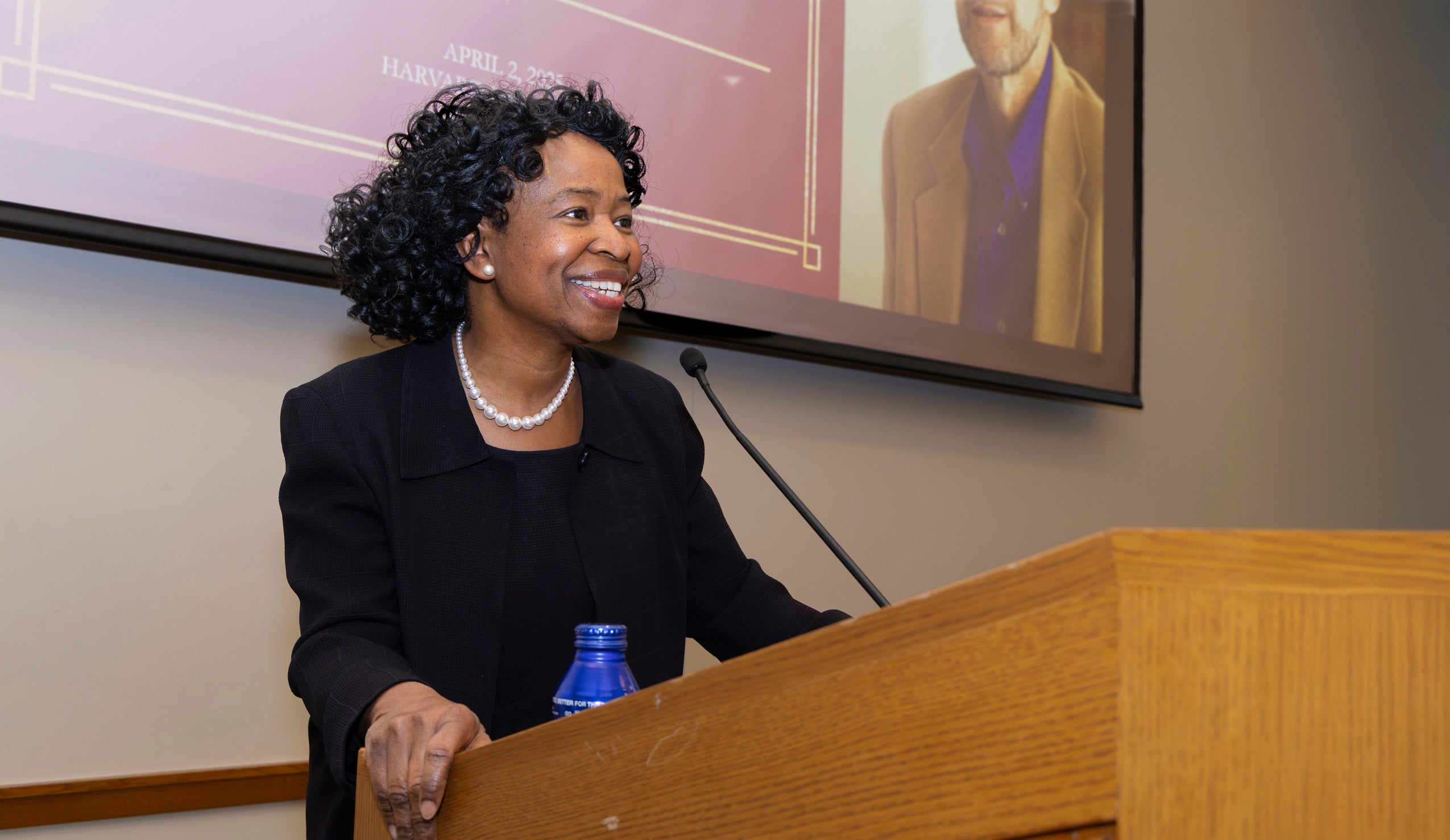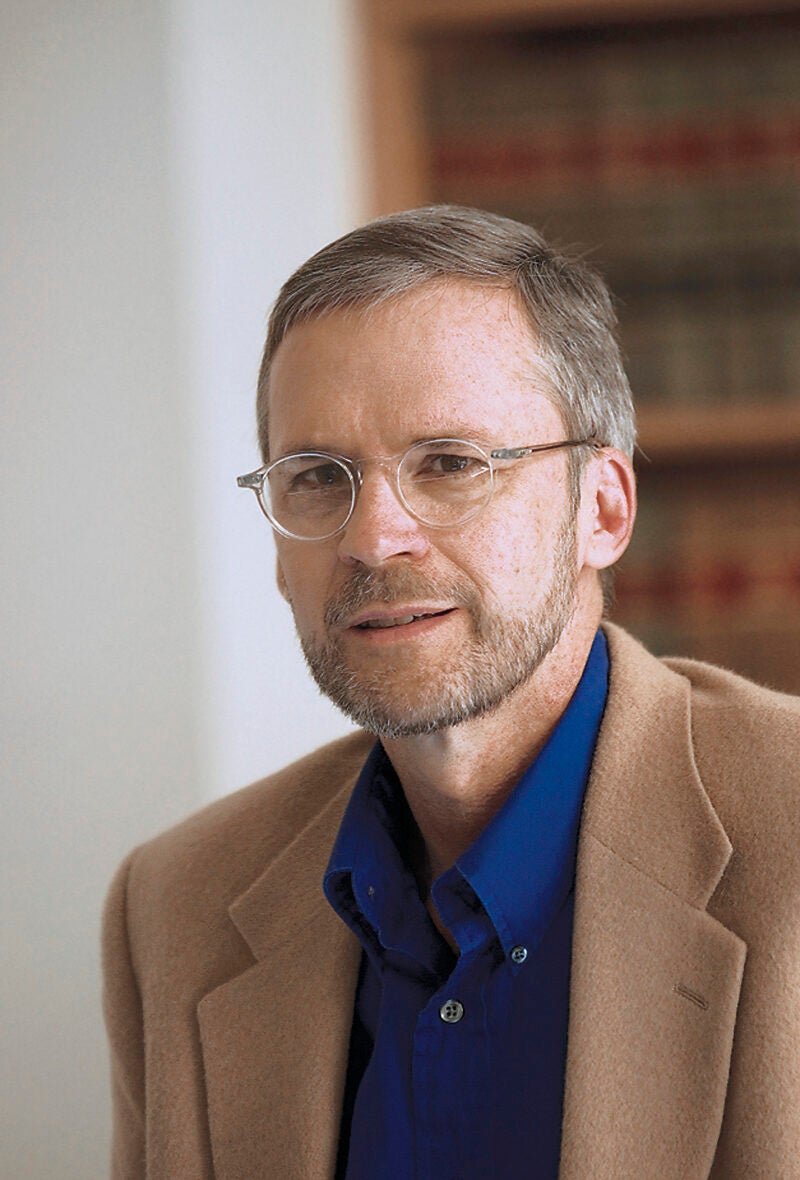He was kind and caring, brilliant and brave, an intellectual giant and a humble servant, and he was a central part of the Harvard Law School community, blending his deep religious faith with his legal work, setting an example for how to live an authentic life, and inspiring those he met.
In honor of the late William J. Stuntz, an authority on criminal law and procedure who also wrote widely on Christianity and the law, Harvard Law School’s Program on Biblical Law and Christian Legal Studies featured an afternoon and evening of discussions last spring that culminated in a fireside chat featuring a number of distinguished speakers. The event was sponsored by the William J. Stuntz Legacy Project — an initiative of the program developed by Faculty Director Ruth L. Okediji LL.M. ’91 S.J.D. ’96, the Jeremiah Smith, Jr. Professor of Law, and a committee chaired by Judge Thomas Griffith — and included close friends, colleagues, and admirers of Professor Stuntz.
In his opening remarks, John Goldberg, then interim Harvard Law School dean, called Stuntz, who died in 2011 at 52 after a long battle with cancer, “brilliant, infinitely patient, energetic — even in very difficult times,” and someone who loved being a contrarian and helping his students and colleagues at every opportunity.
Goldberg recalled how he experienced that help firsthand years ago when he opted to teach criminal law. “Bill was unbelievable. He was so patient with me and taught me so much,” he said. “It’s one of the blessings of my life that I even had a brief time to get to know Bill.”
Thomas B. Griffith, former judge for the U.S. Court of Appeals for the D.C. Circuit, and a Harvard lecturer on law, moderated the evening discussion. He said Stuntz was the perfect role model for young scholars struggling with how to blend their faith, or any other passion, with the study and practice of law. Stuntz proved, in a secular age, you could be at the “finest law school in the land, and that you can succeed by being your true self, your authentic self,” said Griffith, adding that “we want people to be inspired by his example.”
One of those inspired by Stuntz was U.S. Supreme Court Justice and former Harvard Law School Dean Elena Kagan ’86. Early in her deanship, Kagan tapped Stuntz to be part of an informal circle of advisers she met with weekly. She also asked him to take charge of building the school’s intellectual community. That proved a perfect fit.

“He did it just naturally. It’s just what he liked, talking to people. He loved ideas. He thought that he could learn from pretty much anybody, whether it was a student or a colleague,” said Kagan. “And he thought we all get smarter if we think about things together.”
Stuntz’s “eclectic set of ideas,” added Kagan, also made for interesting discussions.
“Sometimes he agreed with you, and sometimes he thought that you were saying the most ridiculous thing in the world, and you could never really tell which side you were going to wind up on. But that’s part of what I loved about him,” said Kagan, “and the way he participated in the intellectual conversation at the law school.”
Martha Minow, Harvard’s 300th Anniversary University Professor, who was also one of Kagan’s advisers at the time, recalled how Stuntz often said the “smartest thing in the room” during their weekly meetings. “No matter what the kind of scholarship was,” said Minow, “he was like an X-ray. He would go all the way through it, see it all.”
Among the many who lauded Stuntz as a great mentor willing to offer both praise and honest analysis to anyone, especially students, was Stephanos Bibas, a judge for the U.S. Court of Appeals for the 3rd Circuit. Bibas was a young criminal procedure scholar just entering the field when he met Stuntz at Yale University. “He instantly made time for me,” said Bibas, who recalled sitting down with Stuntz to solicit feedback on an article he’d written on a topic familiar to both, and his surprise when Stuntz told him: “You’re right. I overclaimed in my earlier article, and you revised my view importantly.”
Stuntz also left a lasting mark on Andrew Oldham ’05, a judge for the U.S. Court of Appeals for the 5th Circuit. Oldham recalled how Stuntz “opened his home” to him during admitted students’ weekend and later taught him much when they worked together while Oldham pursued his J.D. at Harvard.
“He had forgotten by that point more about the law than I will ever know in my career,” said Oldham, “and I was still trying to help him with every fiber of my being. And he loved me. He mentored me. He’s the reason that I’m such a proud Harvard Law School graduate.”
Addressing his lasting legacy, Minow described the Harvard Law School campus in 2000, when Stuntz arrived, as “a very secular place,” where people with religious views “didn’t bring them to anything public.” Stuntz made an immediate impact. “It was very clear from the minute he walked on the campus that he meant something to a whole group of students who didn’t have anyone to talk to,” said Minow. “I think that this is a place now where more people feel they can be their full selves.”
In a keynote address, Jack Goldsmith, Harvard’s Learned Hand Professor of Law, who first worked with Stuntz at the University of Virginia Law School, said: “So many people have noted that Bill’s faith permeates his legal scholarship in its emphasis on mercy and compassion … [and] on the criminal justice system’s failure in these regards.” They have pointed, he said, to “Bill’s critique of what he called the ‘disaster of criminal justice in our time,’ especially its deep racism, and to his commitment to the possibility of redemption and reform.” Yet Stuntz’s faith, said Goldsmith, “radiated far beyond his criminal law scholarship.”
In addition to being open about his Christian identity and doing good professional work, Stuntz lived the precept of loving thy neighbor, Goldsmith said.
“He saw everybody was made in the image and likeness of God — everyone is of inestimable worth.”
“God put in Bill’s path a lot of people who were very, very different from him, yet he responded to everyone with a charitable love. And it had an impact.” Even political discord couldn’t eclipse true connection, added Goldsmith. “Through his example, he taught us that political disagreements are often about means rather than ends, and that more is to be gained by empathizing and understanding our political opponents than by demonizing them.”
Bibas pointed to Stuntz’s deep faith as the source of his profound concern for and kindness toward others. “He saw everybody was made in the image and likeness of God — everyone is of precious inestimable worth. And when someone approaches you in that spirit, it calls on you to respond, to reciprocate, not to get your defenses up. … You met Bill, and you knew that he cared about you.”
